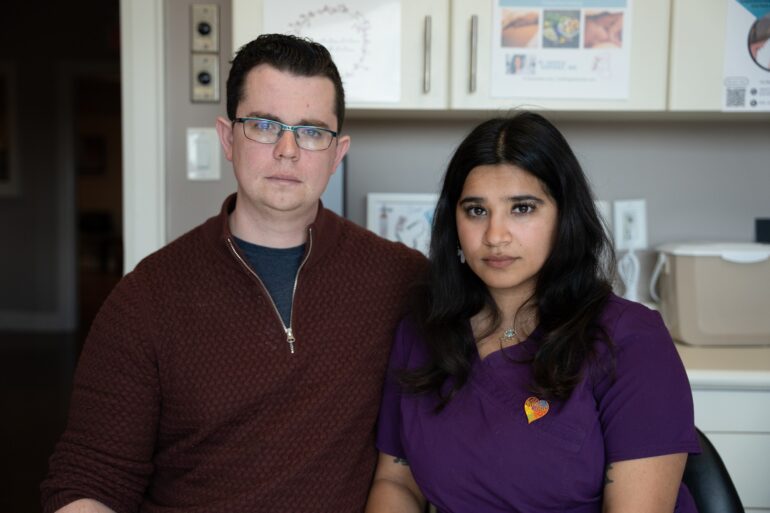Midwife Maha Maryam-Killoran was outraged when she heard the Ontario government was ending the temporary program that gave health insurance coverage to all Ontarians, regardless if they had OHIP or not.
“These are people who are part of our community, they’re people I got into this profession to serve. It’s really heartbreaking to see them dismissed this way,” she said.
The temporary COVID-19 measure ended on March 31 after being available for the last three years to those who needed it. When some health care providers and advocates in favour of keeping the program heard it was ending a few days before, they rallied at Queen’s Park in hopes to reverse the provincial government’s decision.
Maryam-Killoran had spent the day chanting and phoning local MPP Caroline Mulroney outside the legislative building in protest.
She was “disheartened” the rally couldn’t stop the decision before the cuts came in.
“I think ultimately it will have fatal implications,” Maryam-Killoran said about the provincial government’s decision.
Midwives provide care to clients regardless of their residency status and can access it for free as long as they are residents of Ontario. But Maryam-Killoran said that it’s the hospital fees that can range widely.
She said that births can cost $10,000 or more.
Maryam-Killoran has had clients who were worried about going bankrupt because of their insurance status. She said one client, in particular, was saved by “undue hardship” from this temporary insurance program because their visa had expired while they were here as an international student: pregnant, single and on her own.
“She was so worried. I remember getting that call from her being so scared that she wouldn’t be able to pay for the cesarean section, for the anesthesia involved, for the facility fee, for the obstetrician, all of those things,” Maryam-Killoran said.
Ontario Health Minister Sylvia Jones said during a question period in the legislature three weeks ago that there is “no change” in the way uninsured clients will be receiving care.
She said the only change is how hospitals, community health centres and midwifery centres will be reimbursed for insuring and providing that care.
Maryam-Killoran said there will always be “generous” healthcare providers giving care to uninsured clients without being paid for it.
“That doesn’t mean that they’re able to do the same amount of work. It means you have to pull strings. It means that burnt-out healthcare providers are already staying later or working longer hours,” she said.
The Health Network for Uninsured Clients, an advocacy organization that represents more than 70 health and community service organizations released a report shortly after the cuts were announced. They said the temporary program allowed easier access to health care for all by reducing “financial hardship” for uninsured clients.
“It’s that uninsured clients are still being charged facility fees, they’ve still got this mountain of fees they need to pay to just access care, even if they’re able to find a care provider who’s willing to do that work for free,” Maryam-Killoran said.
Jason Killoran, a sessional instructor and PhD candidate at Queen’s University has several international students in his classes. He said because the program is ending, his students will now have to “pick and choose” when they can get care. And when they do, it’s now an additional cost for them.

Maha Maryam-Killoran and her husband Jason Killoran at Midwives of York Region to advocate for those affected by the health care cuts to uninsured clients that took effect Mar. 31. Photo credit: Andre La Rosa-Rodriguez
“There’s been times where they need support from the hospital or health care,” Killoran said. “It’s been great for the last number of years that they’ve had coverage, if there’s any time or any instance in which they feel that they need support, they can freely go and do so.”
Mental and physical health and well-being are prioritized in Killoran’s classes. Over the last number of years, especially following the pandemic, he said several students have needed extra accommodation.
“The fact that they’re not able to get that means that they’re not able to set up their lives here and if we’re preventing those students from getting their careers started and established, then we’re just hurting Canada in general,” Killoran said.
“Anybody who comes here and is working hard and trying to set up a good life for themself and contribute to society absolutely has the right to health care in whatever capacity they need,” he said.
Currently, the decision to reverse the cuts remains unchanged. But Maryam-Killoran said she will continue to post on social media to spread awareness for uninsured clients.
“I think that it’s a really common misconception that these are visitors or they’re tourists, or whatever misconceptions or biases that people may have,” she said.
“Ultimately, the people that we’re talking about are residents of Ontario,” Maryam-Killoran said.
“They’re not people who are just here visiting, these are people who are contributing to our growth as a province and as a country Especially these babies, these are our future and they’re our most vulnerable citizens,” she said.

